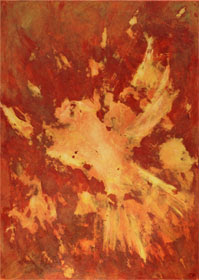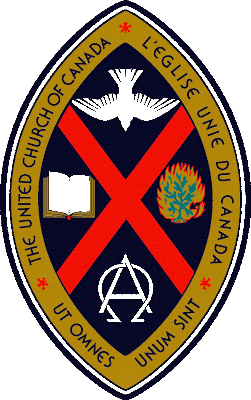
Take a moment to centre yourself in prayer:
Gentle Spirit of God, you touch us with love, you are with us and within us, closer even than our breathing. You are the melody of all creation, poured out in songs of hope and healing. You warm our hearts with the passion of your compassion. You cast glimpses of beauty in our imagination and spark our creativity. You set a table for us, a feast of grace and welcome each and every one. Stay with us now, Spirit of God, Spirit of Life, Amen
How many of you grew up celebrating Pentecost? Talking about “spiritual gifts”? Speaking in tongues or worshiping with an “ecstatic” faith?
Historically, Reformed Protestant churches, like the United Church of Canada and its forebears, stopped marking holy feast days like Pentecost as “too Roman” at the time of the Reformation in the 16th century. From the Age of Enlightenment in the 18th century, which emphasized critical thinking and rationalism, there was equal suspicion about the work of the Spirit as “too evangelical” or "too emotional".
The importance of the Spirit reappeared in Methodist, Baptist, Pentecostal churches but, by and large, the churches emphasized intellectual assent, rather than emotional bonds or spiritual visions.
In the 1980’s the World Council of Churches and similar ecumenical movements became stronger, led to discussions and greater ties between Roman Catholic, Orthodox and Protestant churches. In the United Church, this meant the reintroduction of symbols like candles and stoles, followiong the lectionary, more liturgical symbolism.
Since 2000, there has been greater influence from Evanglical churches’ success with youth and young adult ministry and the focus on “spirituality” has increased in mainline churches.
Questions for Reflection:
How do you understand the “Holy Spirit” at work in your life? In your church?
Genesis 11:1-9
1. Now the whole earth had one language and the same words. 2. And as they migrated from the east, migrated eastward+e --> they came upon a plain in the land of Shinar and settled there. 3. And they said to one another, ‘Come, let us make bricks, and burn them thoroughly.’ And they had brick for stone, and bitumen for mortar. 4. Then they said, ‘Come, let us build ourselves a city, and a tower with its top in the heavens, and let us make a name for ourselves; otherwise we shall be scattered abroad upon the face of the whole earth.’ 5. The Lord came down to see the city and the tower, which mortals had built. 6. And the Lord said, ‘Look, they are one people, and they have all one language; and this is only the beginning of what they will do; nothing that they propose to do will now be impossible for them. 7. Come, let us go down, and confuse their language there, so that they will not understand one another’s speech.’ 8. So the Lord scattered them abroad from there over the face of all the earth, and they left off building the city. 9. Therefore it was called Babel, because there the Lord confused balal, meaning to confuse the language of all the earth; and from there the Lord scattered them abroad over the face of all the earth.
Traditional interpretation of this passage is that it is about human pride and punishment – God is putting humanity in its place.
In verse 1, we read that the “whole earth had one language and the same words”. This is an indication that this story is based in primeval times, with an ancient understanding of the world. It asks the question: If we all descended from one family, how come there are different languages in the world?
In verse 4 humanity's real intention is revealed. Saying “otherwise we will be scattered” they demonstrate the desire for central authority, which could be seen by all, and would make all people like them.
So, was God worried that the human race would usurp divine power or that they would become like dictators over their own people? In verse 6, the words are open to interpretation!
The actual translation is something like “they will not be restrained from all they can imagine…”
Is it good for us to get everything we want?
Or does God want us to focus on what we really need, so that we can have room and time to think about what others need…
Then the people were scattered by their language differences and “they left off building the city.”
An alternative perspective on this story suggests a new interpretation: Is cultural diversity really meant to be God’s punishment? Or is it God’s delight?
It seems clear that difference is part of God’s design, and aspiration for the world.
Question for Reflection:
How does this change your understanding of the changing demographics of Canada? Are we closer to God’s vision?
Acts 2: 1-21
When the day of Pentecost had come, they were all together in one place. 2And suddenly from heaven there came a sound like the rush of a violent wind, and it filled the entire house where they were sitting. 3Divided tongues, as of fire, appeared among them, and a tongue rested on each of them. 4All of them were filled with the Holy Spirit and began to speak in other languages, as the Spirit gave them ability.
5 Now there were devout Jews from every nation under heaven living in Jerusalem. 6And at this sound the crowd gathered and was bewildered, because each one heard them speaking in the native language of each. 7Amazed and astonished, they asked, ‘Are not all these who are speaking Galileans? 8And how is it that we hear, each of us, in our own native language? 9Parthians, Medes, Elamites, and residents of Mesopotamia, Judea and Cappadocia, Pontus and Asia, 10Phrygia and Pamphylia, Egypt and the parts of Libya belonging to Cyrene, and visitors from Rome, both Jews and proselytes, 11Cretans and Arabs—in our own languages we hear them speaking about God’s deeds of power.’ 12All were amazed and perplexed, saying to one another, ‘What does this mean?’ 13But others sneered and said, ‘They are filled with new wine.’
14 But Peter, standing with the eleven, raised his voice and addressed them: ‘Men of Judea and all who live in Jerusalem, let this be known to you, and listen to what I say. 15Indeed, these are not drunk, as you suppose, for it is only nine o’clock in the morning. 16No, this is what was spoken through the prophet Joel: 17“In the last days it will be, God declares,that I will pour out my Spirit upon all flesh, and your sons and your daughters shall prophesy,and your young men shall see visions, and your old men shall dream dreams. 18Even upon my slaves, both men and women, in those days I will pour out my Spirit; and they shall prophesy. 19And I will show portents in the heaven above and signs on the earth below, blood, and fire, and smoky mist. 20The sun shall be turned to darkness and the moon to blood, before the coming of the Lord’s great and glorious day. 21Then everyone who calls on the name of the Lord shall be saved.”
There are a number of points of points of interpretation in this story which shape its impact:
Timing: The feast of Weeks, Shavuot in Hebrew – a harvest festival and commemoration of the giving of the 10 commandments, which signifies the birth of Jewish identity. Pentecost for Christians is the birth of Christian identity. Does this coincidence "replace" or "fulfil" the Jewish festival?
Who: "all together in one place" In Acts 1:15 the whole community is estimated about 120 persons (presumably both men and women). OR, as it says in Acts 2:14 "Peter, standing with the eleven" might refer to only the twelve disciples. OR in Acts 2:5, there is mention of "all those living in Jerusalem, of many nations". How expansive was the gift of the Holy Spirit?
What: Was it glossolalia, or was it a real ability to translate the message into other languages? The languages were mostly obscure, making it even more surprising, and sending the message that EVERYONE needed to hear.
Was Pentecost the opposite of Babel? Giving us one universal language of faith? Or was Pentecost a divine stamp of approval on multiculturalism, translation and the extension of the gospel into many nations?
Why: Peter refers to Joel’s prophecy “in the last days”, indicating that he believed God’s reign was close. There can be both eschatological or political interpretations. Joel was predicting the end of an occupation by foreigners,so Peter may have been predicting the end of rule by Rome. At the same time it is clear that the first generation of Christians believed that the end times were about to begin: the coming of the Day of the Lord had begun.
Question for Reflection:
How can you see your interpretation of this story shaping your understanding of the church’s mission? How is your interpretation shaped by your experience of the church?
Closing Prayer: based on Psalm 104:
O God, how manifold are your works! With Wisdom, you have created us in diversity, so that the earth is full of your creativity.
Even the Seas, full of living things both great and small. All creatures look to you, for you fill them with goodness.
When they cannot find you, they despair. They need your breath to live. When you send out your Spirit, you renew the face of the earth.
O God, may your glory endure forever, and may you rejoice in all your works. I will sing to you my whole life long, I will praise you with every breath. Amen









